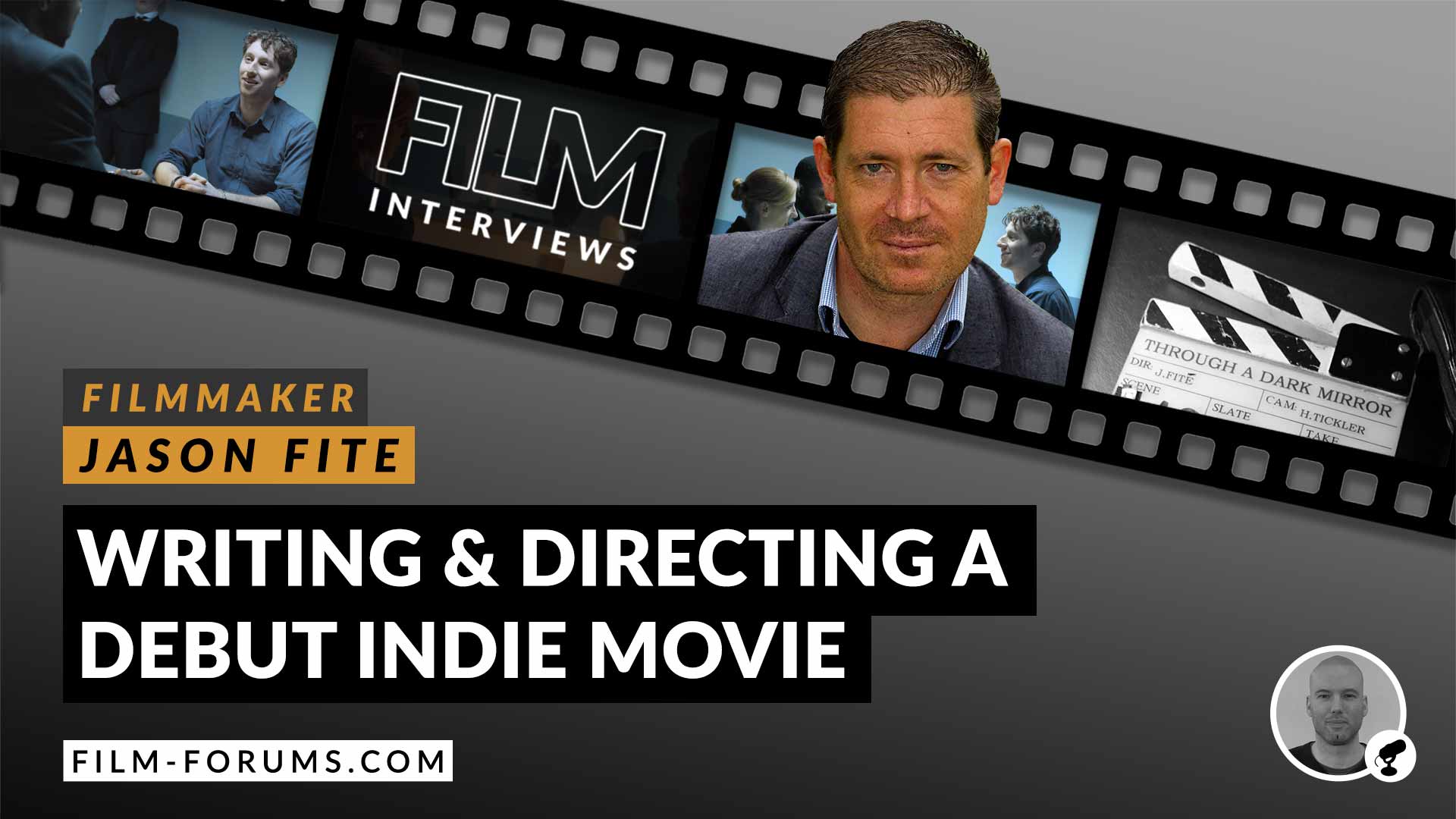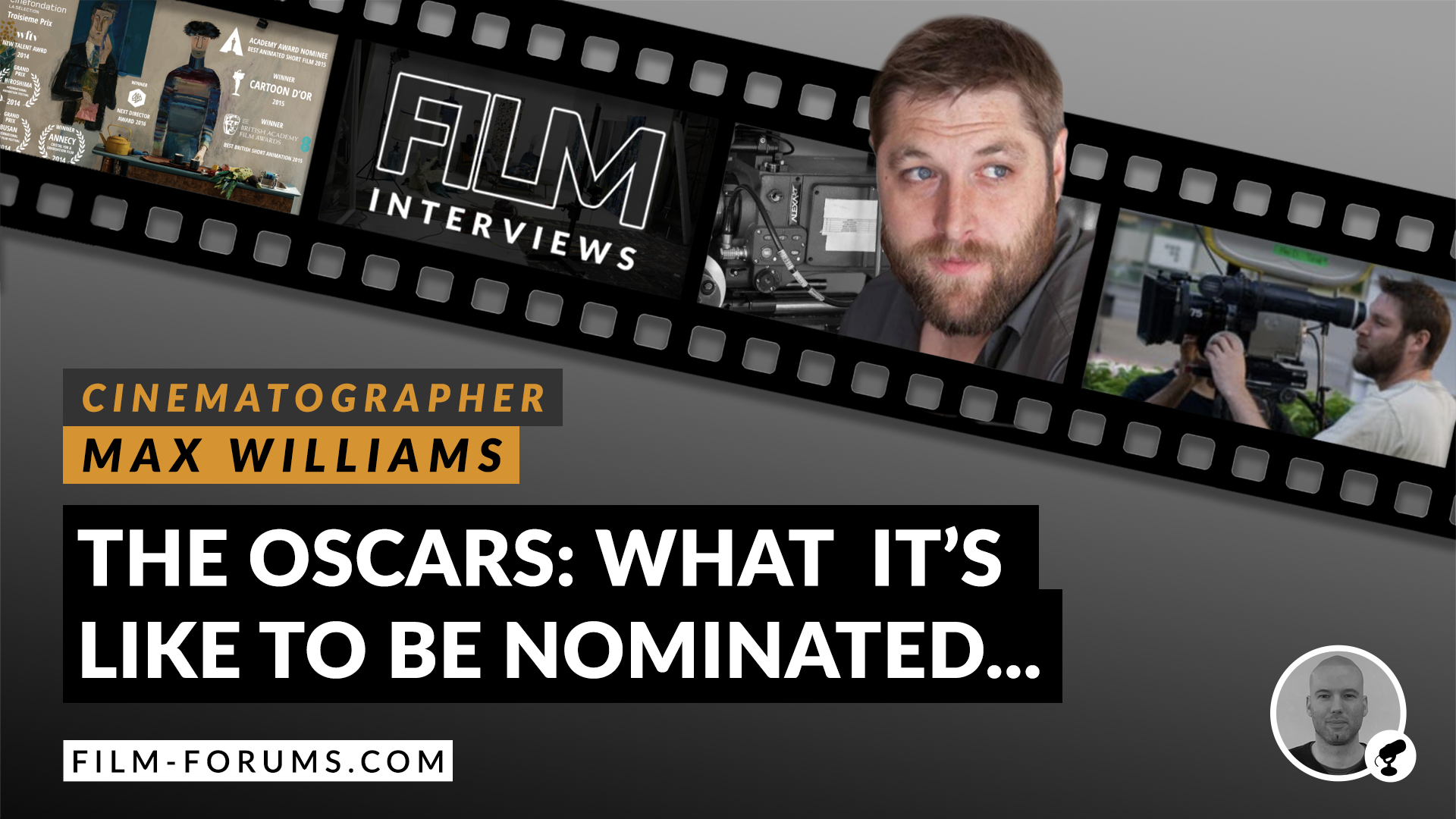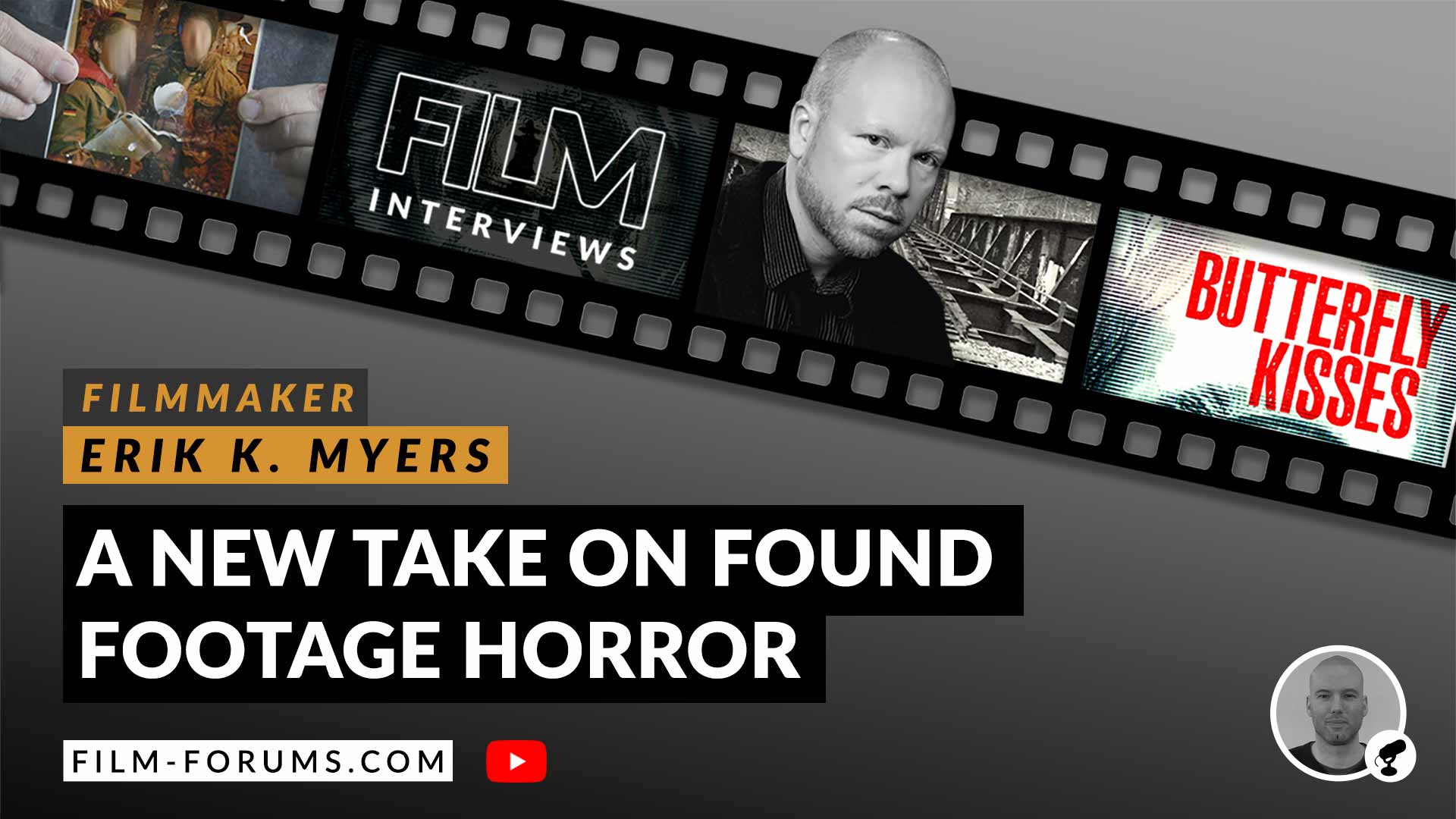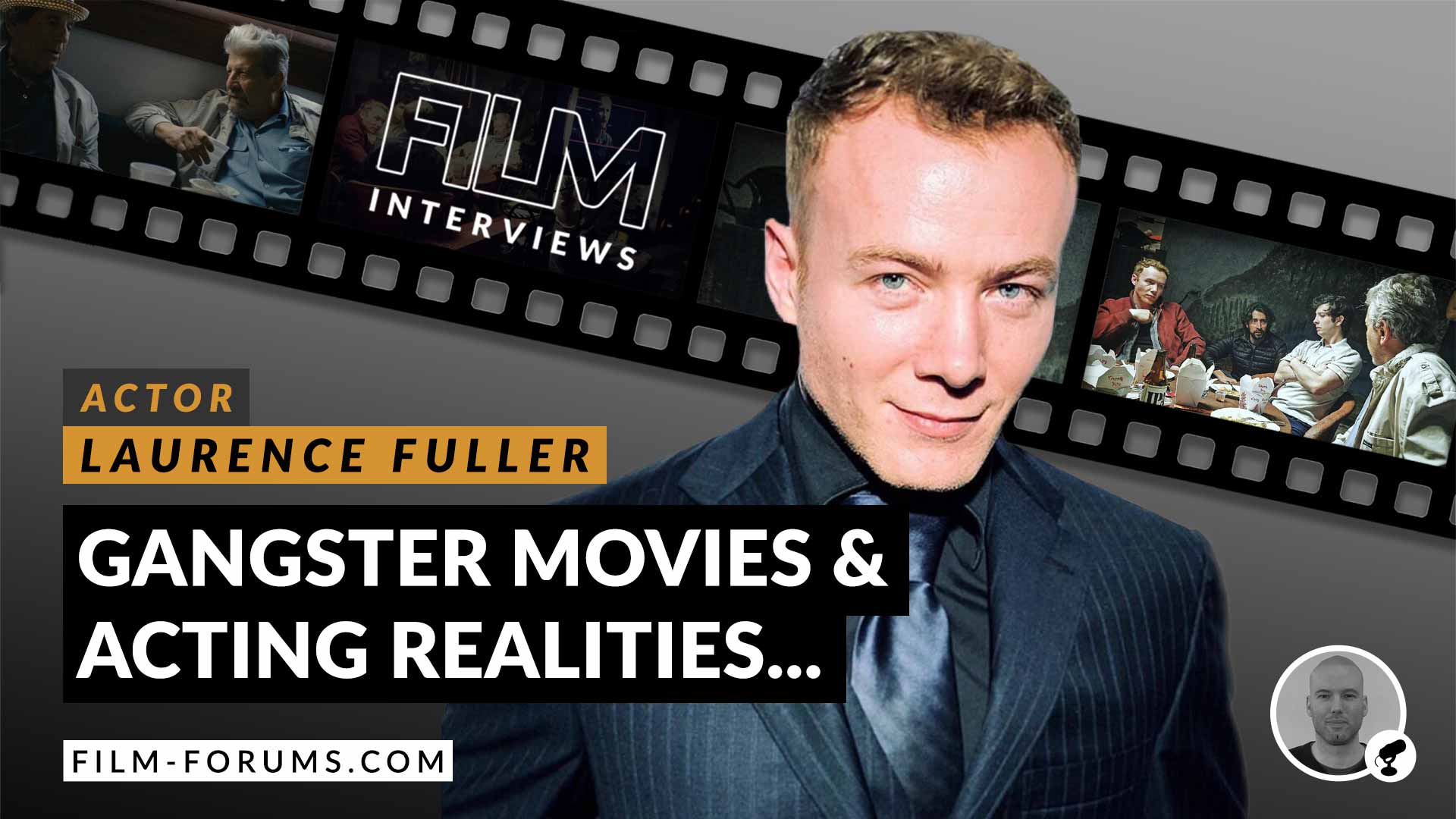I previously interviewed Jason Fité about his award-winning short film Mea Culpa (2018) (starring Blade Runner’s Sean Young), along with the producer Barbara Toschi. When the opportunity arose to discuss his first feature-length film Through A Dark Mirror (2019) with him, I jumped at the chance…
FF: From what I can gather you started out as a writer and you now have your own film studio, Peracals, where you write, produce, direct, cast, etc. How did that all transpire?
JF: Well, I was originally a novelist. So, I wrote two novels which never made any money or got a particularly large readership. One of the novels was then optioned for a screenplay, so I wrote the screenplay but then it kind of went into development hell and it was never made. I then got commissioned to write two or three other scripts which, again, also never got made, which is quite common with scripts; a lot of scripts get written but they won’t necessarily go into production.
Perhaps this is going to sound a bit pompous but, I thought, if I film my own scripts then at least they stand a good chance of getting them made… So, yeah, it was a few years of frustration of these scripts that just weren’t going onto the next stage. So I started off doing short films, sketches and then slowly got into theatre and feature films as well.
We’re just about to set up an audio department as well, so we are doing audio recordings of various scripts and plays etc. So that’s something exciting that’s coming up soon!
FF: That’s interesting. Clearly, podcasts are really taking off now…
JF: Yes, we used to have a podcast which was a comedy sketch show in the early days of podcasting; now we’re going to try and resurrect more podcasts. They’re much more popular so I think there’s a huge audience now as well; it’s a part of a lot of people’s daily lives.

FF: Why the name Peracals?
JF: It’s the name of a very tiny, obscure village in the Pyrenees which is where the Spanish branch of my family come from. I went there a few years ago and kinda just saw the name and it instantly struck me as a really great name for company.
FF: What advice would you give to budding writers?
JF: In my 20s I was sitting indoors writing and never really putting my work out there into the world… writing is kind of like your baby and if someone is critical of it, it’s actually really quite painful. I’ve got a bit more thicker skinned recently…. I’d rather have someone say that I’m fat and ugly than say they don’t like my script! It sounds weird but it’s that personal kind of attack… it’s like my dream and my imagination that people are criticising.
So, I think you have to find people that you really trust and will give you good feedback without being too critical for the sake of it. I’ve found that you can write something that’s 99% perfect but people will focus on the 1% that’s not perfect. So, yeah, to me, it’s about being courageous enough to get your work out there and be quite tough when you get feedback. I think that whatever you do, however great it is, a lot of people won’t appreciate it, so you just have to understand that.
I think I realised this because, a few years ago, I gave a few friends a copy of The Great Gatsby, which is universally believed to be one of the greatest novels ever but they really didn’t like it. So then I kind of thought ‘ok, if you’re not liking The Great Gatsby then I’m not so worried if you don’t like my writing!’.
I think if something’s well written and it’s written with heart and passion then it will find an audience, it just might take time to find one. It’s always worth trying new avenues. Writing is very much a question of perseverance and also going very much with your own instincts. If something feels right on the page then it’s probably going to connect with other people. But it is a very difficult job because you are essentially locked in with your imagination and you’ve got to try and make other people try and understand what’s going on and, yeah, it’s tough, there’s an awful lot of competition.
One of the best things I found was actually just going out and making connections. There’s lots of groups for writers now. Also, there’s things like Funzing who do lectures on psychology, for example, so it’s worth going along to things like that with like-minded people who are interested in the same subjects. Again, it’s just about making connections and putting yourself out there really. It does come down quite a bit to luck; you have to be in the right place at the right time. Keep knocking on doors and keep persevering.
FF: I’m sure a lot of what you just said would be applicable to this next question: what would your advice be to budding directors?
JF: What I found is actually the best thing is to have a really good team to work with. If you don’t then it’s going to be virtually impossible. Directing, I find, is extraordinarily difficult because you have to be on top of everything essentially. You have to know the script inside out, you have to be aware of what the actors are doing, you have to be aware of the lighting, the sound, pretty much the whole caboodle! But if you’ve got people you can trust that are really on the same page as you, working together, that’s a lot of the battles won already. A lot of it is down to preparation as well.
With directing, once or twice, I’ve kind of gone in… not blind, but without doing enough preparation and winging it slightly and, I think, once I got away with it and once it was a nightmare! So, I think it just comes down to a lot of preparation and it’s a lot of hard work and also finding a way to keep calm because things will go wrong and people will stress you out! You’ll be asked an endless amount of questions you can’t answer! It’s good to adopt a kind of knowing nod as well, as in ‘yes, that’s exactly it, I know exactly what you’re saying’.
It’s a difficult one because I think everyone has different approaches to it… Expect the occasional disaster and also try to be a bit playful about stuff and just enjoy it as well. It can be very tough to enjoy it. There was a director we used to work with called Braham Murray who sadly passed away last year and he had a very famous phrase which was: ‘the worst it can be is a disaster’, which I think is true! It’s like, ok it can be a disaster but that’s still not that bad in universal terms.
Also, loving what you’re doing as well… you need that element of passion.
FF: Can you explain what Through A Dark Mirror (2019) is about and what gave you the idea?
JF: It’s had a very long gestation actually. It’s part of a much bigger story. So, what we’re seeing with Through A Dark Mirror (2019) is, essentially, one chapter in a story that goes on afterwards and has a long lead up to the story. The larger story follows the main character, Tyler, and then afterwards we follow the character Lincoln on his story. So, this is where they meet for the first time.
Initially it was intended as a much larger story or at least I outlined it… I wanted to do a one feature ‘proof of concept’. Obviously we couldn’t use a massive budget and we weren’t really that well established so we couldn’t really go that over-the-top in terms of production, so I developed a story which could be effective with just having five characters in one interior location. So I think that was really our remit: making it about the dialogue, the acting and making a story whilst still making it look quite amazing. I think we achieved that and it’s come out really well I think.
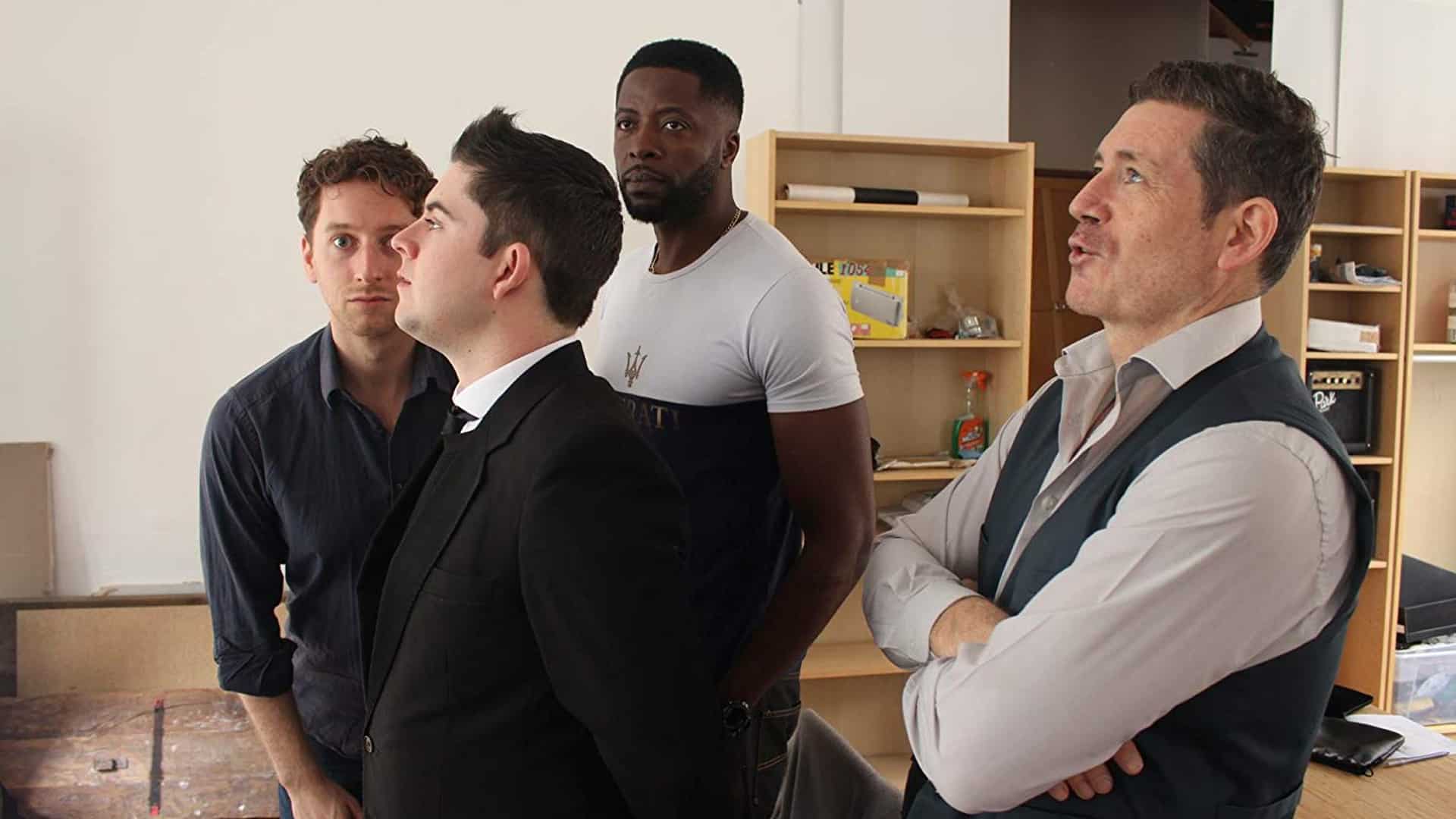
FF: How long did it take you to write this feature-length screenplay compared to your short film Mea Culpa (2018) for example?
JF: Well, it was a very much a rapid fire dialogue piece… I spent, I think, 1 week organising the structure and then maybe three weeks actually writing and then after that there’s a process of rewriting and polishing and changing bits here and there. I think I wrote the original script about 10 years ago if not longer. It’s taken a while to come this far.
With Mea Culpa (2018) I actually wrote that rather quickly, in probably about 2 ½ days. It’s only a 23 minute piece, which is obviously not massively long compared to a feature but I do remember writing it on Christmas Eve… Sitting in the office a bit like Scrooge writing my script! I think I pretty much completed it on that Christmas Eve; I kind of said to myself that I’m not going to go home until I’ve sort of finished it. I didn’t think about it a huge amount; I had the ideas in my head and it almost wrote itself… obviously not exactly… ‘I was visited by these three ghosts on Christmas Eve and they just helped me write the script…!’ But, no, it just came very naturally. It wasn’t forced. I pretty much sat down and typed and it’s finished. It’s nice when that happens!
FF: Have you always held an interest in the paranormal, something that Through A Dark Mirror (2019) increasingly touches on?
JF: Yes, I think I’ve always had a natural interest in otherworldly things. I don’t know where it originates from… There’s no religious background in my family. If I think back from many, many years ago, when the world was much younger and the internet didn’t exist, I bought a book called Great Mysteries of the World and that kind of triggered my fascination I think. There was also a series called Arthur C Clarke’s Mysterious World which, again, as a child, really fascinated me and might have been a springboard for my interest in things that aren’t normal or the paranormal. But I’m a little cynical, and I read an awful lot, I believe not so much…
At the moment it’s a very interesting time because there’s the study of consciousness which has really kind of broadened in the last 10 years and they’re discovering incredible things with quantum consciousness. Essentially, the whole nature of reality is now up for grabs which is quite fascinating for me.
Actually, our next film is bringing in some of those elements as well. It’s been an ongoing fascination for me.
The paranormal is very much about ideas as well. It gives you possibilities and ideas: what would happen if this or that happened…it escalates and you can make incredible stories out of it as well.

FF: What challenges did you face during filming Through A Dark Mirror (2019) and did the final version come close to what you set out to achieve?
JF: It went relatively smoothly, actually. The producer Barbara Toschi was very instrumental in getting everything organised. There weren’t any major hiccoughs! We shot it, I think, in about 11 days.
I had worked with the actress Leonie Zeumer before so I knew she was great. The other guys we auditioned and they were quite amazing. For example, Peter Parker Mensah, who plays DCI Dawson in the film, was doing an interrogation scene and he put his fist down and actually broke the table! So, we thought, ‘Ok, he really means it!’ So that’s partly how he got the part.
Filming itself went relatively smoothly. Again, we did a lot of rehearsals and a lot of preparation. Very unusually nothing really went wrong during the filming which I’m very grateful for. Again, it came down to having a really great team on board. Working together with great actors you can really make some magic.
To be absolutely honest, I think the film came out even better than I expected. It was my first proper feature as a director so I was finding my way to a certain extent and relying on the team and the actors. I think it did come out pretty well considering.
FF: Why is the film set in October 1992, rather than the present day?
JF: Again, it goes back to the larger story which at the moment is called ‘The Heroes’ and it’s meant to be a series that goes through the entirety of human history and we have different glimpses of different time periods. The idea with this film is that we see Lincoln when he’s a very young boy and in the future we will actually see him at a much older age, so that’s what ‘92 is about. It needed to be that era as well; it really fits in with a much larger story. There may be a cryptic reason why it’s that specific date, but that will be revealed in future…
FF: In my opinion Alexander Tol’s performance as Brian Tyler, the antagonist in the film, is particularly strong. Was there a role of his from a previous film or TV series that caught your eye and led to his involvement?
JF: Actually it was entirely down to this audition. The work he’s done before is great, but he wasn’t how I originally saw Tyler at all. He came in and he was kind of a slightly goofy guy and he was very funny and very pleasant. I remember thinking that this isn’t really the sinister Machiavellian Tyler but then he sat down and did the audition and he was absolutely amazing. We had this assistant who sat beside me and whispered to me ‘he’s the one!’ As soon as he came in and read we just knew he was the one.
On paper he didn’t look like the character, he was a bit too young etc. but he was outstanding. I think he just did an amazing audition and then an amazing performance as well. He has this rare thing which is the gift of stillness. A lot of actors are about facial movements and perhaps exaggerate, but he is very compelling.
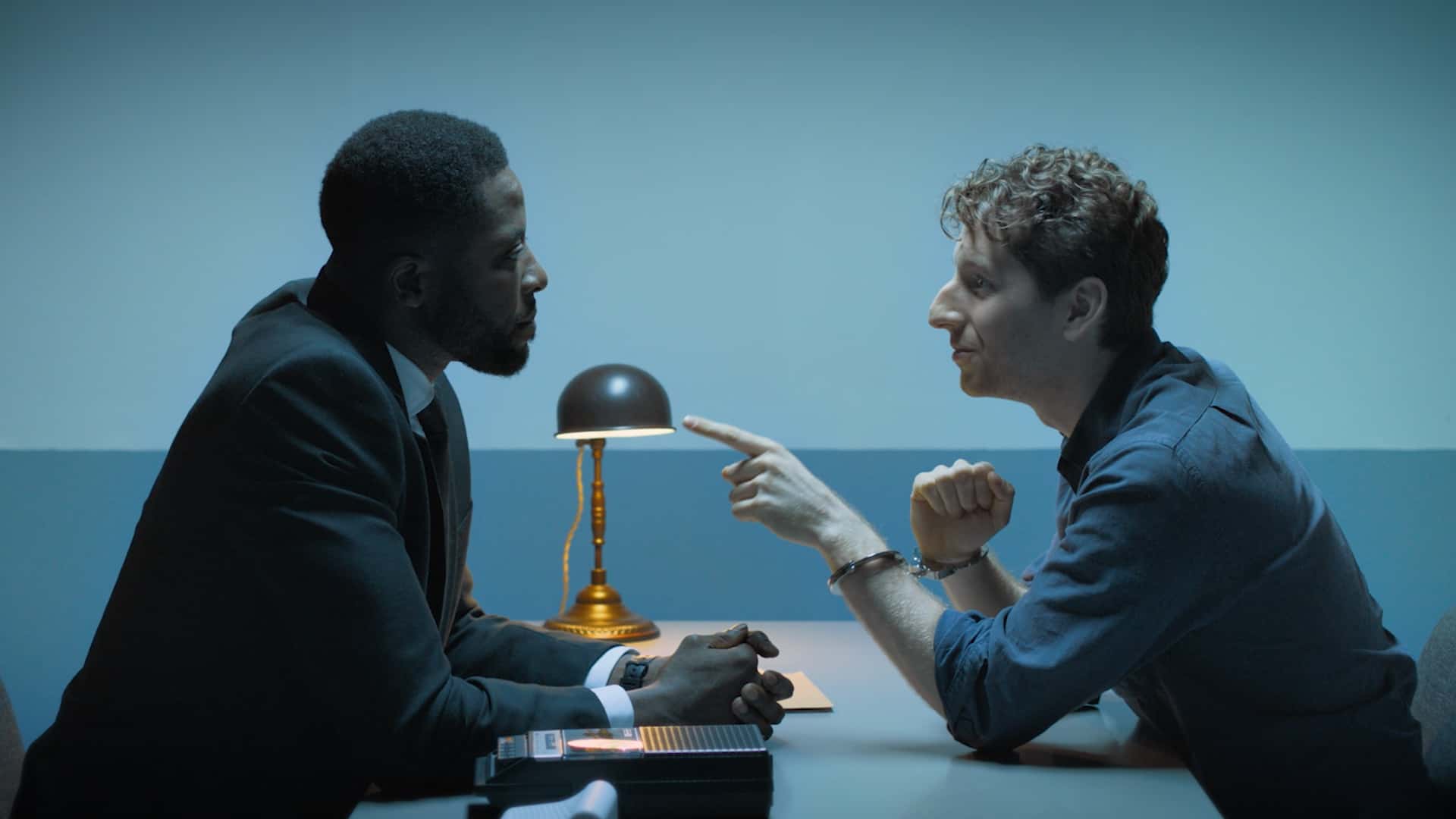
FF: Brian exposes other characters’ secrets and flaws. Is that an allusion to the title… of holding up a ‘dark mirror’ to them?
JF: Yeah, it’s kind of like they’re in a confessional booth and he’s their confessor but they don’t realise it. So the mirror is meant to be a reflection of their true nature back to them but also, potentially, the audience watching it. It lets you see yourself back again and your kind of darker more sinister side. I always find mirrors a very kind of powerful device for revealing a character’s inner thoughts or emotions.
FF: Brian uses his participation in a tennis tournament as his alibi. Is that an intentional metaphor, because he’s kind of playing verbal tennis and scoring points with the detectives?
JF: It’s a slight nod to that idea – if he was playing golf then it wouldn’t have quite the same kind of resonance. Throughout the script there are little hints of what he’s ultimately up to. So the tennis thing, it’s not a mind game as such but there is, yeah, the whole back and forth cat and mouse element.
FF: Why does Gor stand in the corner silently for long periods?
JF: From a dramatic point of view I think it creates quite a bit of tension. Going back to police interviews they used to always have someone just standing guard, especially if it’s someone suspected of murder. It was meant to be a slightly sinister kind of presence as well. And again, if we go back to the much larger story, there’s a significance to that as well, to why he’s doing that which will be revealed, hopefully at some future date when we make the series.
We will see all of the characters in this film again in different scenarios and will then understand why they become what they are at this particular time.
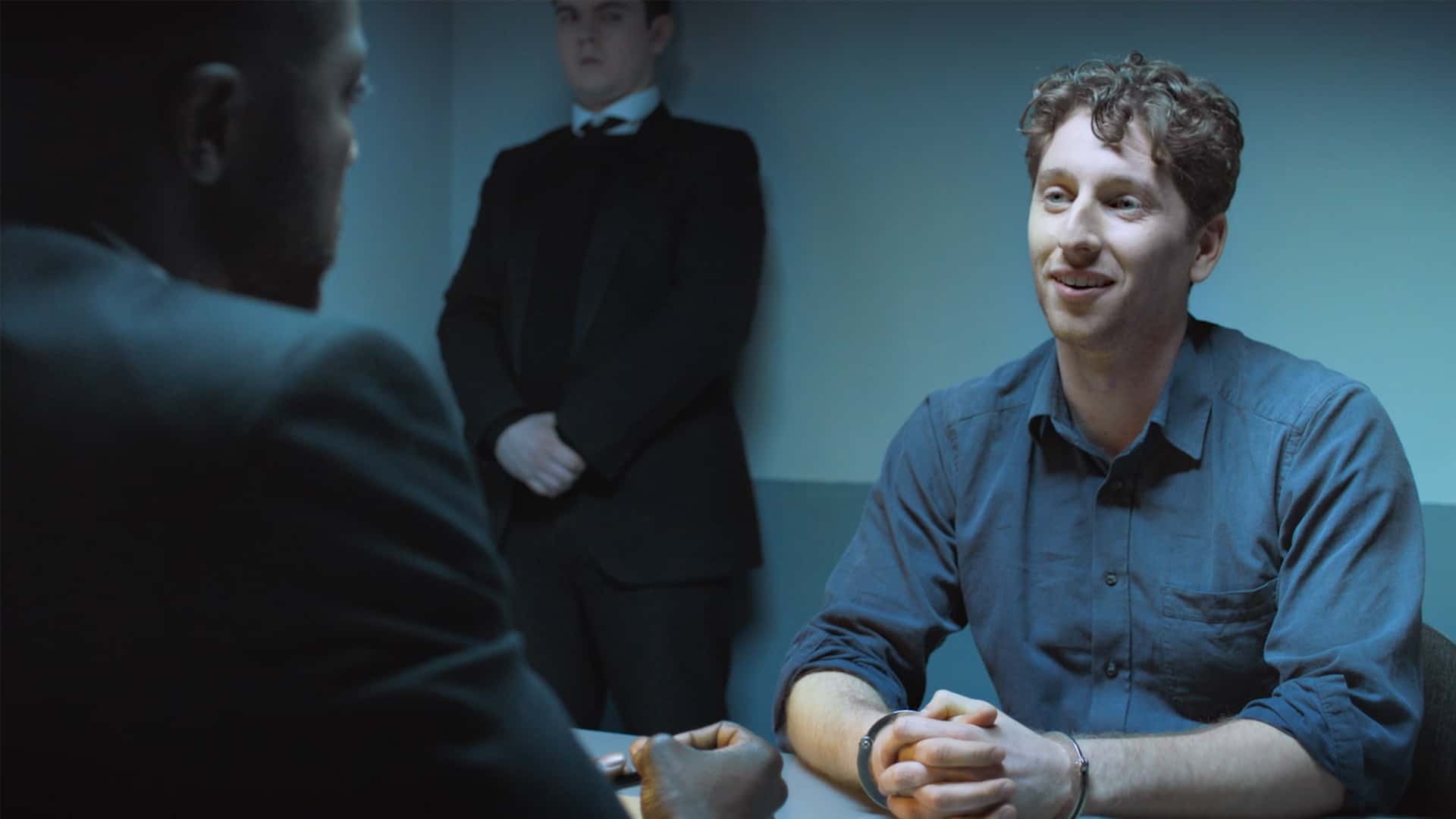
FF: There are some homophobic references in the film. Is that a comment on society at the time?
JF: Yes, it was very much of that era in the 90s. There used to be a much greater degree of, I don’t want to say brutality, but at times the police could be really quite unpleasant in terms of how they interviewed people. Homophobic comments might be a way of getting a reaction from people. It’s very much something of its time I think. Dawson especially is trying to find a way of finding some kind of weakness or antagonise Tyler.
I have to admit when I was writing it, I was a bit wary… it is something I wouldn’t want to express personally and obviously it wouldn’t be expressed these days, but I do think it very much was the time and place and worked in that context.
In relation to the larger series, we go back and there’s racism and there’s institutionalised horrors, so there’s an element of that. We are more enlightened these days to a great extent.
FF: What’s the main takeaway that you’d like the audience to get from this film?
JF: The characters are all deeply flawed, I think. They’re not so terribly flawed that they’re inhuman or we can’t relate to them to some extent, though. Dawson is a terrible person, treats his wife badly, but he also has a softer side and loves his wife. Tyler is not a very pleasant person in a lot of respects. So it’s kind of just the black and white of human nature.
The series itself is about the good and bad that’s inside humans, as it develops over time and over people’s lifetimes as well. So that’s one thing I’m trying to introduce in this episode at least; not everyone’s sympathetic.
I wanted to show that we’re almost like eavesdropping on this part of life without any kind of larger context or explanation. It’s meant to be something that has a question mark at the end. A lot of people have asked why we haven’t we wrapped up who Tyler is and what his relationship with Lincoln is… I like the idea that the audience watching will have a discussion about the possibilities as well. That’s the kind of TV or drama that I find very entertaining.
I was very obsessed with the TV series Lost when it came out. I was constantly second guessing what was really going on. So I think I wanted to get some of those elements as well.
Also, with David Lynch, you understand what’s going on in an emotional sense, or instinctive sense, but you still have lots of questions at the end.
I find it frustrating when you do see a film and you have everything neatly wrapped up at the end. So hopefully Through A Dark Mirror (2019) is something that people will wake up late at night thinking ‘who was Tyler?’ and ‘what on earth was that about?’

FF: Well, you’ve definitely achieved that. I watched it and then I had to watch it again to try and figure some things out…
JF: That’s exactly what I want the audience to do. To watch the film again and try and figure out some of the things they may have missed the first time. The clues are actually in there. So it does make sense, it’s not just something that’s completely random, there is a story and there is a larger truth.
FF: Can you tell us a bit about what you’re currently working on and what’s next for you? In our previous interview you referred to a TV series?
JF: So, The Heroes is the TV series we’re developing which we may change the title of. That’s the much larger story of Through A Dark Mirror. At the moment we’re putting together a pitch deck. I’m very ambitiously outlining 10 seasons… it’s very epic! It’s still very early stages but we have written the pilot episode and we are repitching it this summer in the States. It’s one I’m very excited about; it’s a story that’s been percolating, literally since I was quite a small child. It’s bringing together all of the themes and stories I’ve been doing for years and years.
It encompasses pretty much the entirety of human history going literally from about 8000BC to 2050 AD, so it’s a huge canvas we’re playing with. Again, it’s very early stages, but it should be something really great and exciting that’s coming soon.
Next up we’re actually we’re doing a feature film called Daemon Mind in September I believe (nothing to do with Matt Damon!). There’s a real life machine called the ‘God Helmet’ which was developed by a scientist called Persinger and it’s meant to provide electrical stimulus to the brain which causes you to have a mystical experience. How true that is is up for debate. In this film a neuroscientist creates a new version of it which has interesting results shall we say. There are paranormal aspects with consciousness and imagination as well. It hints at another reality but it’s not a definitive reality; it’s about the power of the mind and imagination as much as anything else. We are hopefully shooting in September or sometime soon.
I own this thing. Being creative makes me tick. Film lover. Coffee hater. Website manager, headline and copywriter, video editor, graphic/motion designer, editor, presenter...

